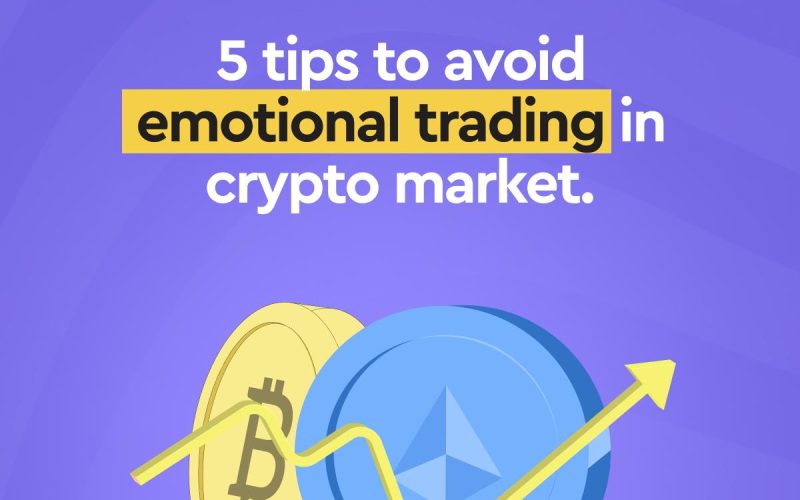Crypto trading continues to gain momentum as a lucrative online venture, driven by the potential of digital assets to experience exponential growth. However, many traders fall into the trap of emotional decision-making, panic-selling during market dips, or rushing to buy out of fear of missing out (FOMO). Letting emotions dictate trading choices in a highly volatile market can lead to significant financial losses. In this article, we will explore emotional trading in crypto and provide essential strategies for staying rational and disciplined in your investment approach.
What Is Emotional Trading in Crypto?
Emotional trading occurs when traders make decisions based on feelings rather than logical analysis and research. It results in impulsive actions and negatively impacts one’s portfolio. Here are four traits that come into play during emotional trading in crypto;
- Fear: Fear can drive traders to sell their assets at a loss during market downturns. However, the project may still have strong fundamentals and show signs of explosive growth.
- Greed: Greed is often motivated by the desire to capitalize on short-term gains. In turn, it may lead to buying at inflated prices.
- Hope: While hope is meant to be a positive word, it can cause investors to hold onto losing positions. They keep expecting a rebound that may never come.
- Anxiety: Anxiety arises from over-monitoring the market. Such a trader will always second-guess their decisions, and this may lead to unnecessary trades.
Tips to Avoid Emotional Trading.
Here are five helpful tips to avoid emotional trading;
- Set Clear Goals and Stick to Them.
Before trading, define your objectives and develop a strategy to achieve them. Whether you aim for short-term profits, long-term investment growth, or a mix of both, a well-structured plan will keep you focused and prevent impulsive reactions.
Write down your goals and review them regularly to reinforce discipline. For example, if you plan to hold Bitcoin for three years, don’t let short-term dips tempt you into selling prematurely.
- Do Your Own Research (DYOR).
Understanding the fundamentals of a cryptocurrency is crucial before investing. Research its use case, technology, market potential, and development team. Stay updated with market trends, but avoid blindly following hype or rumors.
Other good approaches include:
- Reading whitepapers to assess the project’s vision.
- Following development updates and roadmap milestones.
- Seeking insights from reputable analysts and experienced traders.
By relying on research rather than speculation, you reduce the chances of making emotional decisions.
- Diversify Your Portfolio.
A well-diversified portfolio can lower overall risk. Holding multiple cryptocurrencies instead of concentrating on a single asset helps mitigate volatility. Studies suggest diversification can reduce investment risk by up to 30%.
For instance, instead of investing solely in Bitcoin (BTC), consider including Ethereum (ETH), Solana (SOL), or other promising assets in your portfolio. This way, if one asset underperforms, others may offset the loss.
- Stay Informed, But Don’t Overreact.
While staying updated on market trends is essential, avoid making impulsive decisions based on short-term fluctuations. Focus on long-term trends and project fundamentals rather than reacting to daily price swings. For example, geopolitical tensions in the Middle East affected crypto prices in September 2024. While there were temporary dips, traders who panicked and sold at a loss later realized it was a short-term event.
On the other hand, speculations about Donald Trump’s return to the White House in 2024 fueled Bitcoin’s surge to over $80,000 by December. These examples highlight the importance of assessing whether market events have lasting impacts before making trading decisions.
- Seek Advice And Learn from Others.
Engaging with experienced traders and online communities can provide valuable insights and a balanced perspective. No trader has all the answers, and external viewpoints can help you avoid emotional biases. You can join trading forums and Telegram groups and follow credible analysts who offer guidance during volatile market conditions. However, always verify the information before acting on it.
Frequently Asked Questions On How To Avoid Emotional Trading in Crypto
Question 1: What Are the Common Emotional Traps in Crypto Trading?
The most common emotional traps include:
- FOMO (Fear of Missing Out) – Buying at high prices due to hype.
- FUD (Fear, Uncertainty, and Doubt) – Panic-selling based on negative news.
- Loss Aversion – Holding onto bad investments in hopes of recovery.
- Overconfidence – Making risky trades based on past successes.
Question 2: What Are the Risks of Emotional Trading?
Emotional trading can lead to
- Increased financial losses.
- Higher market volatility.
- Missed profitable opportunities.
- Stress and mental exhaustion.
Question 3: How Can I Control My Emotions While Trading?
To keep emotions in check:
- Follow a clear trading plan.
- Conduct thorough research.
- Stay patient and disciplined.
- Engage with a trading community for objective insights.
Conclusion
Emotional trading is one of the biggest challenges in crypto markets. The extreme volatility can trigger fear, greed, and anxiety, leading to impulsive decisions. However, by setting clear goals, conducting proper research, diversifying your portfolio, and maintaining a long-term perspective, you can navigate the market more rationally.
Staying informed without overreacting and seeking advice from experienced traders can further help you stay disciplined. Mastering these strategies will not only protect your investments but also increase your chances of long-term success in crypto trading. Learn more from the Ridima blog.
Reference
https://prestmit.io/blog/5-tips-avoid-emotional-trading-cryptocurrency-markets
If you loved this article, read more;
https://www.myridima.com/blogs/what-is-the-worth-of-1-btc-today
https://blog.myridima.com/10-tips-to-secure-your-crypto-investment-in-2025/
https://www.myridima.com/blogs/how-much-is-1-dollar-bitcoin-in-naira-today
https://www.myridima.com/blogs/best-app-to-convert-bitcoin-to-naira
https://www.myridima.com/blogs/is-cryptocurrency-different-from-bitcoin
https://www.myridima.com/blogs/is-cryptocurrency-different-from-bitcoin
https://www.myridima.com/blogs/all-you-need-to-know-about-ridima-trading-digital-assets
https://www.myridima.com/blogs/crypto-to-naira-in-seconds-ridimas-groundbreaking-new-feature



